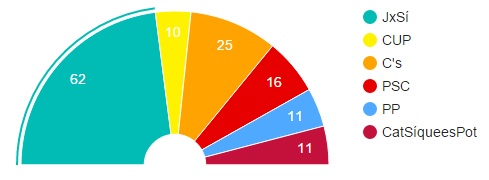On the Catalan regional elections
Catalans want nothing more (but nothing less) than a normal country
by Víctor Colominas i Ruiz, Officer for Foreign and European Affairs, Joventut Nacionalista de Catalunya
As many Catalans, the first thing I could do the 28th of September was reading Spanish newspapers. The day before Catalans were running into a plebiscite elections, after many Spanish government’s bans and legal actions, in order to finally know if most of Catalans were supporting or not independence. For my surprise all I could found was something like this:
El Mundo: “Most Catalans say no to independence”.
La Razon: (President) “Mas does not achieve its goals”.
El Periodico: “Bitter win”.
El Economista: “Mas challenge remains despite its resounding electoral defeat".
Other ways when looking to international media what I found was something completely different:
New York Times (USA): “Victorious Catalan Separatists claim mandate to break with Spain”.
BBC news: “Catalonia vote: Pro-independence parties win elections”.
Bild: “Separatist’s win with absolute majority”.
Aljazeera: “Catalonia separatists claim victory in regional polls”.
And many other newspapers like The Guardian, Le Monde, El Corriere della Sera, Der Spiegel, Deutsche Welle and many, many others from all around the world.
As any Catalan who had followed vote counting, I was really shocked. Poll results were clear. Over 135 seats, candidacy’s supporting Independence (“Junts pel Sí” and “CUP”) obtained 72, more than half of the parliament.
Moreover, there were two parties who both were not supporting either Yes either No (“Catalunya Sí que es pot” and “Unió”) that obtained 11 sits and when summing parties against independence (“Partido Popular”, “Ciudadanos” and “Partit Socialista de Catalunya”) I found that they obtained 52 sits.
Going deeper into numbers, 1,96M (48%) people voted “Yes”, 1,60M (39%) voted “No” and 13% voted other options.
Then, why was Spanish media saying such things? The answers for me was crystal clear, and is the same answer that any Catalan who voted “Yes” would tell you when asked “Why voting Independence”; Spain is not a democratic State. Spain does not respect Catalan’s choices, hopes, and desires and Spain uses Legal, Political, Economical powers, and Media to ensure that those desires are accomplished. Once Orwell said:
<<(···) in Spain, for the first time, I saw newspaper reports which did not bear any relation to the facts, not even the relationship which is implied in an ordinary lie. I saw great battles reported where there had been no fighting, and complete silence where hundreds of men had been killed (···). I saw, in fact, history being written not in terms of what happened but of what ought to have happened according to various ‘party lines’.>>
George Orwell, 1943, Looking back on the Spanish Civil War.
In Spain we have had several cases where media published judicial imputations and charges, before charged itself knew about their new condition. Or even cases where newspapers were telling with detail what judicial courts would decide days before they publish so.
An example of that, proving what Orwell said happened during week campaign. On 25/09 “la Razón” published: (President) “Mas will be imputed after 27S”; the 29th of September, 2 days after Catalan parliament’s elections, the High Court of Justice imputed the President-in-Office Artur Mas an alleged crime of disobedience because of non-official referendum on 9th of November of 2014.
At the end, most Catalans are tired. And Catalonia just ones one simply thing: be a normal country. A country where elections decide, where media tell the truth, where corruption is pursued, and, at the end, where citizens are respected. And thanks to a 54% of Catalan Parliament we will be now able to do so.
April 23 2024
FNF x LYMEC 2024 EU Elections training
EU Elections Youth Training Tuesday, 23.04.2024 -Friday, 26.04.2024 You can apply here before 15 March 2024 at 10 h 00 am CET! We believe it is imp...
Recent Posts

Story of a first-time congress-goer: LYMEC Spring Congress 2024 in Brussels
The murmuring is slowly fading out. As the sunshine disappears, blue and white globes hanging from the roof of Open VLD headquarters start lighting up. Delegates are taking their places, phones and laptops are ready fo...
April 16 2024

Javier Milei and the Revival of the Austrian School of Economics
On November 19 2023, the Argentinian voted to depart from the socialist governance of recent administrations and elected the libertarian MP (and former TV star) Javier Milei as President.
April 05 2024

The New European Pact on Migration and Asylum - A Missed Opportunity?
Estimated Reading Time: 4 minutes The International Organization for Migration (IOM) has released a report that paints a grim picture for the year 2023 as the deadliest year fo...
March 15 2024




Leave your comment